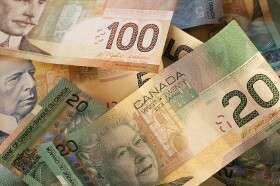The Canadian dollar is weakening against its American counterpart on Monday, driven by falling crude prices and mixed economic data. The loonie was looking to extend the momentum following last weekâs upbeat jobs report, but it has since joined other commodity currencies in the decline.
Investors viewed the latest construction numbers as a mixed bag. According to Statistics Canada, Housing starts surged to a five-month high of 216,000, but this was offset by the 0.2% decline in building permits, a six-month low.
The national economy added 94,100 jobs, beating the market forecast of 10,500. The unemployment plunged to 5.6% in November, down from 5.8% in October.
Like the economic data, the latest comments from the Bank of Canada (BOC) have been mixed. Over the last month, the central bank has shifted its language from hawkish to dovish. At first, the BOC was only discussing rising inflation and positive outlooks. In recent weeks, the BOC has started to sound the alarm about tumbling crude oil prices, the US-China trade war, and household debt levels.
This has left many traders doubtful that the central bank will raise interest rates as aggressively as initially anticipated heading into the new year.
On Monday, US crude prices crashed as much as 2%, occurring at the same time as the markets soften. January West Texas Intermediate (WTI) crude oil futures plummeted $1.01, or 1.92%, to $51.63 per barrel on the New York Mercantile Exchange. After peaking in October, oil prices have cratered 23%, bringing the sector into a bear market.
The latest slump comes after the Energy Information Administration (EIA) reported that the US has officially become energy independent, no longer relying on foreign energy to power the nation. The estimates vary, but the US has depended on foreign markets for at least five decades. It should not come as a surprise that the US is becoming an energy powerhouse after it was reported that new oil and gas reserves were discovered in the Delaware Basin that lies between West Texas and New Mexico. It is estimated that there are at least 46.3 billion barrels of oil and 281 trillion cubic feet of natural gas.
The USD/CAD currency pair rose 0.54% to 1.3394, from an opening of 1.3322, at 17:38 GMT on Monday. The EUR/CAD edged up 0.25% to 1.5208, from an opening of 1.5170.
If you have any questions, comments or opinions regarding the Canadian Dollar,
feel free to post them using the commentary form below.

Canadian Dollar Weakens on Falling Crude Prices, Mixed Data
More from NewsMore posts in News »


Be First to Comment